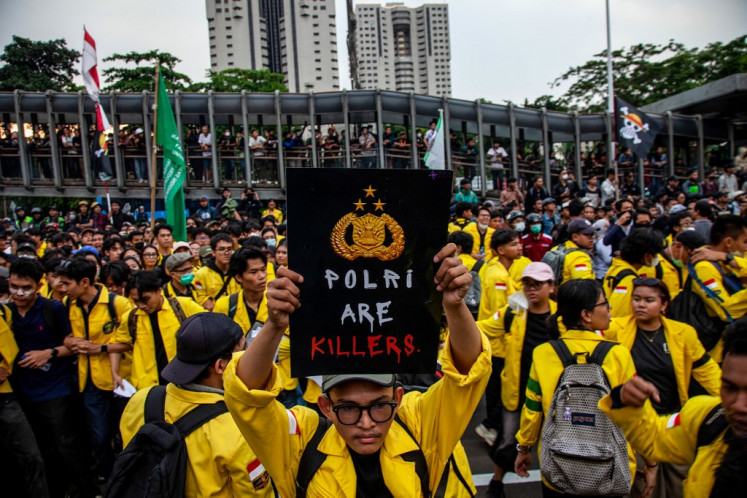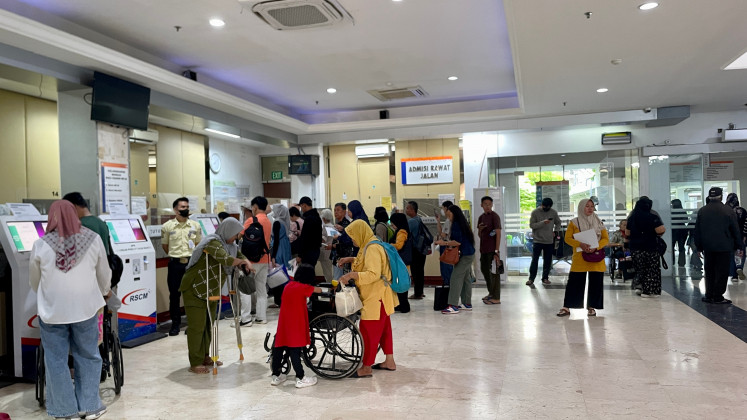Popular Reads
Top Results
Can't find what you're looking for?
View all search resultsPopular Reads
Top Results
Can't find what you're looking for?
View all search resultsGugun Blues Shelter: Reviving blues
Gugun (center), Jono (left) and Bowie (right) from Gugun Blues Shelter perform at @america Pacific Place in Jakarta
Change text size
Gift Premium Articles
to Anyone
G
span class="caption" style="width: 378px;">Gugun (center), Jono (left) and Bowie (right) from Gugun Blues Shelter perform at @america Pacific Place in Jakarta. JP/Putera Hasudungan
Young people often associate blues with old-school people who have thick and long beard, smelly body and frequent bars for hang out. A recent show and talk by Gugun Blues Shelter (GBS) at @america, Pacific Place, Jakarta, could reverse the perception about blues.
Muhammad “Gugun” Gunawan, Muhammad “Jono” John and Aditya “Bowie” Gunawan entered the stage at 7 p.m. They directly heated up the atmosphere and entertained the audience with two songs.
After finishing their performance, they got a discussion about blues with Rolling Stone Indonesia executive editor Wendi Putranto.
“For me, blues represents spirit of reform, spirit of rebellion, [and] spirit of youth exactly. It is not an old and rickety music anymore,” said Wendi, opening the discussion.
Wendi explained that GBS were the one who successfully brought blues to pentas seni (Pensi) — art performance organized by high school students. At times when usually blues band played in bars, suddenly Gugun Blues Shelter played in Pensi and entertained thousands of youth.
Perhaps, he said, GBS didn’t play pure blues as widely known in Delta, Mississippi backed in 1930s. But, at least they played with their blues-rock. They got influences from Led Zeppelin, Stevie Ray Vaughan, Jimmy Hendrix and Cream.
“It turns out that blues could became popular again in Indonesia. It could be enjoyed again by youth, thanks to Gugun Blues Shelter,” said Wendi.
“If blues was originally born in Delta Misissipi, then in Indonesia, blues was born in Duri, Riau,” said Wendi joked, referring to the place where Gugun was born.
Gugun was born in Duri, province of Riau. One afternoon when he was six-years-old, he took his mother’s broom and played an air-guitar. His father saw it then decided to buy him a guitar. After having an instrument, Gugun’s big brother taught him to play. His parents gave full support. Even before he enrolled at school, his parents had introduced him to music from The Beatles and Rolling Stone.
Meantime, Jono the bassist, used to live in UK. At 18 years old, he got bored and went to Australia to get a job. When the visa was outdated, he traveled to Indonesia and visited Aceh with his friends.
When they were traveling around Banda Aceh, the car they rented was running out of fuel. They met two women who lent a help. Jono then exchanged phone number with one of the women, which later became his wife.
After three years lived in Aceh, Jono decided to move to Jakarta. While hanging out at a blues bar in Jakarta, he met Gugun. After a while, they had a jam session at Gugun’s house. As for Bowie, he was introduced to Gugun by one of his friends. Gugun, Jono, and Bowie then met in Kuala Lumpur, to attend Guitar Wars festival. They had a jam session there. It was their first time they played together.
Blues bands often use uncommon name and emphasize their guitarist as the name of the band. It also happens to GBS. Commenting on this, Gugun said that it was because the main menu of blues bands is driven by the guitar. But even that guitar plays an important role, actually bass and drum portion are also dominant.
He referred to the blues in the 1960s and 1970s like Jimmy Hendrix and The Experience in which the drums had a lot of portion too. Blues is about rhythm. So, if the rhythms from the bass and the drum weren’t powerful, it would not be good to listen. “So far I have noted that a lot of blues band don’t notice bass and drum line,” said Gugun.
For Gugun, blues is all about aesthetic and pentatonic. It means blues doesn’t have to be played in twelve-bar pattern. When there are several pentatonic parts in a song, it can be categorized into blues. So, in Gugun’s opinion blues was a seasoning.
Bowie said that he never knew how to define music. Instead of giving a definition about blues, he compared between jazz and blues. “Jazz is blues, and blues is jazz. Jazz is a renewal of blues. If you can play blues, you can play jazz too,” said Bowie.
Meanwhile, Jono said that blues was more than just music for him. He said originally the lifestyle of blues musicians did not relate to drugs. However, he said, the booming of blues in the 1960s with the appearance of The Beatles, Rolling Stone, and Jimmy Hendrix had made blues identical with drugs.
“In fact, the real blues, the source of the blues have nothing to do with drugs or alcohol,” said Jono.
Many parents disagree if their children want to become musician. Bowie was one of them. His parents wanted him to be an accountant. “Maybe they were worried that a musician will not have a prosperous life. But so far, it has a prospect,” said Bowie.
Talking about income, Gugun said that they couldn’t rely on their CD and cassette selling as their main income because the amount was small. But if we looked the schedules for off-air show, it was not bad.
He also said that all the GBS personnel lived more than enough as musician. But even they lived more than enough, they haven’t been satisfied.
“We still have to try. At least we play this music [so] it doesn’t die. No need to turn back. We can still play music that we believe in,” said Gugun.
The writer is an intern at The Jakarta Post










